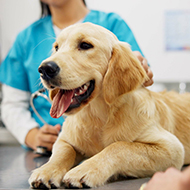Police promote safe dog walking in countryside
The RSPCA advises dog owners to always keep their dogs on a lead when near livestock.
Dog owners are being urged to take care when walking their dog in the countryside, as part of a campaign by police and charities to tackle livestock worrying.
Operation Recall’s national week of action, running from 27 March to 3 April, will see police forces raising public awareness about how to walk dogs safely in the countryside.
Police drones will be used to monitor hot spot areas and a flagship event will be held at Tegg's Nose Country Park, Macclesfield, on Saturday, 30 March.
Dog owners are also being urged to sign a pledge to walk their dog responsibly and report any attacks to the police.
The campaign was founded last year by Cheshire Constabulary, in partnership with the RSPCA and Naturewatch Foundation as well as the National Rural Crime Unit. This year, forces around the country are taking part, including those in Hampshire, Gloucestershire, and Suffolk.
As part of its work to raise awareness about the impact of sheep worrying, Operation Recall has also produced an educational video which offenders have to watch if they receive a caution.
Recent research by the National Sheep Association, which is running its own Sheep Worrying Awareness Week from 25 March to 1 April, found that 78 per cent of the rural crime teams which responded to its survey had seen a rise in dog attacks on sheep in recent years.
In February, an incident in Devon, currently being investigated by the police, made headlines after more than 40 sheep, including lambs, were killed.
Kate Salmon, Operation Recall lead for Naturewatch Foundation, said: “The consequences of attacks for all animals involved can be devastating. Some people go out for a walk with their dog, or unknowingly allow their dog to escape their property and return home without their family pet.
“With more awareness and self-responsibility, people can enjoy their pets, whilst keeping them and livestock safe. We're calling for everyone to protect their dog and protect livestock.”
Image © Shutterstock



 The CMA has invited comments on a draft survey invitation letter, as it continues its investigation into consumer experience.
The CMA has invited comments on a draft survey invitation letter, as it continues its investigation into consumer experience.